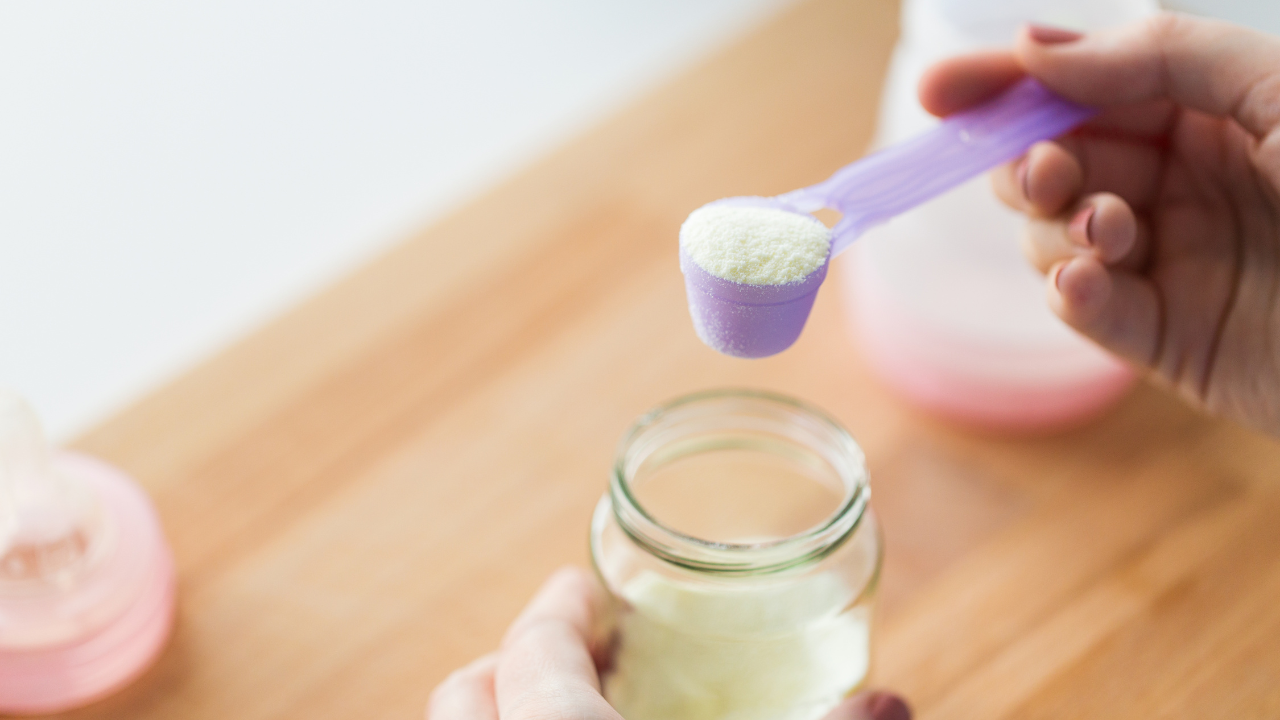
Formula allergy. If your baby frequently vomits or has diarrhea after drinking formula, they may be allergic to the cow’s milk protein found in most formulas.
Formula allergies are typically caused by a milk allergy. A milk allergy is an atypical immune response in which the body reacts to the protein in milk as though it’s a foreign invader that needs to be fought off.
Milk allergy is the most common food allergy in children. In fact, 2 to 3 percent of kids under age 3 show symptoms of an allergy. Just because your baby has signs of a milk allergy, though, doesn’t necessarily mean they’re allergic to milk – it could be an intolerance or sensitivity, which often causes the same gastrointestinal issues.
If you think your baby might be allergic to the formula you’re giving them, bring it up with your pediatrician. They can help pinpoint what’s causing your baby’s discomfort.
A milk allergy or intolerance can be hard to manage, but the good news is most babies outgrow it by about 18 months to 2 years old.
Signs of an allergic reaction to formula
It’s not surprising that some of the most common signs of an allergic reaction to formula are gastrointestinal, including:
- Vomiting
- Diarrhea
- Blood or mucus in the stool
- Unusually hard or excessively loose, watery, and foul-smelling poop
- Abdominal pain
Frequent spit up and excessive gassiness may also be signs of a milk allergy.
Not all signs of a formula allergy are gastrointestinal, though. Other signs of an allergy include:
- Itchy, watery, or swollen eyes
- Chronic nasal stuffiness
- Runny nose
- Cough
Your child may also develop itchy raised bumps on the skin known as hives. This is a type of skin rash that often occurs as a result of an allergic reaction. Hives can appear anywhere on the body and may look like tiny spots, blotches or large bumps.
Another common rash that may appear with a formula allergy is known as eczema (atopic dermatitis) and can cause red, itchy or dry skin. Eczema tends to show up on the cheeks and scalp in babies but can appear anywhere on the body.
If you notice that your baby is continually fussy or crying and has obvious signs of discomfort shortly after you’ve started feeding, talk to your baby’s doctor. Babies with milk allergies can show symptoms anywhere from days to weeks after first drinking cow’s milk-based formula.
In some cases, a severe food allergy may cause a life-threatening reaction called anaphylaxis. If your baby has any of the following symptoms, call 911 or go to an emergency room immediately:
- Turning blue
- Wheezing
- Trouble breathing
- Facial swelling (including the lips or tongue)
It can be difficult to tell the difference between a milk allergy and lactose intolerance, since both conditions can cause uncomfortable gastrointestinal symptoms. If you have any concerns at all, talk to your baby’s pediatrician. They can help figure out whether your baby has a milk allergy, lactose intolerance, or some other issue.
Lactose intolerance is primarily a digestive issue in which the body doesn’t produce enough of the enzyme lactase to properly digest the lactose in milk. Lactose intolerance can cause diarrhea, bloating, and gas in infants, but it’s usually not dangerous. It’s more common in adults than in children: If your child does have this condition, they likely won’t start showing signs until they’re at least 3 years old.
What to do if your baby has a formula allergy
First, check with your child’s doctor to make sure that something else isn’t causing the reaction. Once they rule out other possibilities, they may recommend a hypoallergenic (hydrolyzed) formula or an amino acid-based formula that’s processed to avoid allergic reactions.
Your doctor most likely won’t recommend a soy formula – soy is also a highly allergenic food, so if your baby is allergic to milk, they may also be allergic to soy. In fact, about 8 to 14 percent of babies with a cow’s milk allergy will also have a reaction to soy. Ask your baby’s doctor before switching to a soy formula.
Your baby’s doctor may also recommend keeping epinephrine auto-injectors on hand for your baby in case they accidentally have a milk product and have a severe reaction to it.
Read more about


Add a Comment